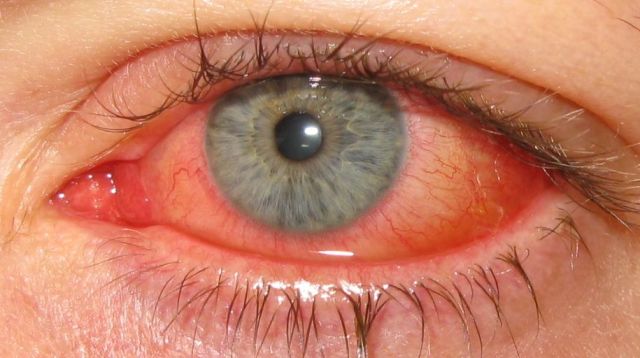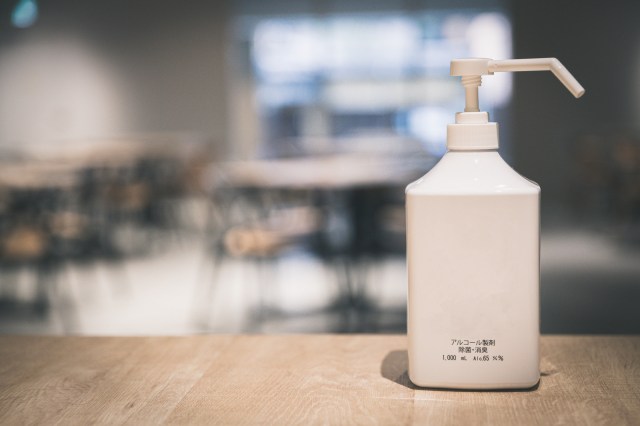
Wrongfully accused man also loses job after being labelled as “the SARS guy.”
At about one o’clock in the afternoon on 31 March, as Japan was just getting warmed up to the possibility of a COVID-19 state of emergency, a man in his late 50s popped into a convenience store in Joyo City, Kyoto Prefecture.
The man was on leave from his job at an ophthalmology clinic where he worked as a technician. He had caught a case of adenoviral keratoconjunctivitis which is a relatively mild but highly contagious viral infection of the eye, very similar to pink eye. Because of his condition, he thought it wise to warn the clerk while paying.
▼ A mucusy red eye probably won’t kill you but it will certainly ruin your day

“I have something that is contagious by touching, so please disinfect this,” while handing over his payment. However, the clerk just looked at him strangely, so he repeated more simply, “Put alcohol on this.” Once the purchase was complete he left and went about his day.
Four days later the police paid him a visit and placed him under arrest for “obstruction of business,” a broadly defined crime that involves impeding a business’ ability to function.
On that fateful day in the convenience store, after the man had left, the clerk immediately told her manager that someone had come in saying, “I have SARS.” The manager then called 110 (the police emergency number) and closed the store for over two hours so that it could be completely sterilized.
The man denied the charges, claiming that he’d never said he had SARS at all. On that day his words in Japanese were “Boku (I) sawaru (touch) to (and) utsuru (transmit),” while it is a stretch, it’s not completely implausible that the “sa” in “sawaru” and “tsuru” in “ustsuru” could be misheard as “SARS” (“sahzu” in Japanese) under certain conditions.

An investigation was launched and by 14 May, the public prosecutor decided not to file charges because the security camera footage yielded no evidence of him saying “SARS.” However, by this time the incident was reported nationwide, and while most major outlets didn’t print the man’s name, it still managed to get out onto the internet.
He since had to resign from his job and is having difficulty finding new work due to the current economic situation and his newfound notoriety. He told Sankei Shimbun, “My name is still on the internet as ‘the SARS guy’ and it’s devastating. What else can I say, except times are rough now.”
Most people sympathized with the man, but others pointed out that there was lots of blame to go around.
“That’s like the plot of some absurd comedy.”
“That’s a good way to encourage infected people to hide their illnesses.”
“That guy might have a tongue infection too.”
“He should sue for everything he went through.”
“He shouldn’t have gone to a convenience store in his condition in the first place.”
“I can’t really blame the clerk. He never specified his illness and in these circumstances what was she supposed to think?”
“He lost everything, just for doing the right thing. That’s so sad.”
“The police were way out of line here.”
That last sentiment was echoed by the man’s lawyer who told media, “the misunderstanding was unavoidable, but the problem here is the police. He was arrested before the investigation was properly conducted such as through scrutinizing the surveillance camera evidence. They got the procedural order wrong.”

This sparked further discussion on the topic of police misconduct which originated in the U.S. and sent shockwaves throughout the world, including Japan.
“This kind of stuff is going to start an anti-police movement like they have in the USA.”
“If the police had just had a basic conversation with the guy before arresting him, it probably would have been an open and shut case.”
“The people criticizing the police are probably the kind that get an attitude whenever they get questioned on the street.”
“If the police didn’t arrest him and he did end up having SARS then everyone would have piled on them for being lazy. They can’t win.”
This incident happened in March, and social anxiety has only gone up since then. Last April, about 1,300 110 calls regarding COVID-19 concerns were made in Tokyo alone. Even though the initial wave has subsided, fears of returning to all that in a potential second wave is perhaps even more mentally taxing for a lot of people.
It’s important to keep that in mind when interacting with others and to value patience and communication as much as possible, because times are certainly rough, and even a simple trip to a convenience store can turn disastrous over simple misunderstandings.
Source: Sankei News, Sanspo, Hachima Kiko
Top image: Pakutaso
● Want to hear about SoraNews24’s latest articles as soon as they’re published? Follow us on Facebook and Twitter!

 Man who knowingly spread coronavirus to various bars in Aichi dies in hospital
Man who knowingly spread coronavirus to various bars in Aichi dies in hospital Hokkaido man arrested after asking convenience store to lend him money
Hokkaido man arrested after asking convenience store to lend him money Kyoto man arrested for forcing appliance store clerk to shave own head in apology
Kyoto man arrested for forcing appliance store clerk to shave own head in apology Saitama senior arrested after calling telecom provider 24,000 times to complain
Saitama senior arrested after calling telecom provider 24,000 times to complain Confirmed coronavirus patient in Aichi told to go home, goes bar hopping instead
Confirmed coronavirus patient in Aichi told to go home, goes bar hopping instead Highest Starbucks in Japan set to open this spring in the Tokyo sky
Highest Starbucks in Japan set to open this spring in the Tokyo sky Saitama is home to the best strawberries in Japan that you’ve probably never even heard of
Saitama is home to the best strawberries in Japan that you’ve probably never even heard of Starbucks Japan adds new sakura Frappuccino and cherry blossom drinks to the menu
Starbucks Japan adds new sakura Frappuccino and cherry blossom drinks to the menu The 10 most annoying things foreign tourists do on Japanese trains, according to locals
The 10 most annoying things foreign tourists do on Japanese trains, according to locals Shibuya Station’s Hachiko Gate and Yamanote Line stairway locations change next month
Shibuya Station’s Hachiko Gate and Yamanote Line stairway locations change next month Survey finds that one in five high schoolers don’t know who music legend Masaharu Fukuyama is
Survey finds that one in five high schoolers don’t know who music legend Masaharu Fukuyama is Adorable Totoro acorn key holders come with a special guest hidden inside[Photos]
Adorable Totoro acorn key holders come with a special guest hidden inside[Photos] Burning through cash just to throw things away tops list of headaches when moving house in Japan
Burning through cash just to throw things away tops list of headaches when moving house in Japan Transparent coffee! We taste-test Asahi’s Clear Latte, marvel at Japanese drinks wizardry
Transparent coffee! We taste-test Asahi’s Clear Latte, marvel at Japanese drinks wizardry Studio Ghibli displays The Boy and the Heron Academy Award Oscar in Japan for a limited time
Studio Ghibli displays The Boy and the Heron Academy Award Oscar in Japan for a limited time Starbucks Japan releases new sakura goods and drinkware for cherry blossom season 2026
Starbucks Japan releases new sakura goods and drinkware for cherry blossom season 2026 Naruto and Converse team up for new line of shinobi sneakers[Photos]
Naruto and Converse team up for new line of shinobi sneakers[Photos] Is Sapporio’s Snow Festival awesome enough to be worth visiting even if you hate the snow? [Pics]
Is Sapporio’s Snow Festival awesome enough to be worth visiting even if you hate the snow? [Pics] Japan has trams that say “sorry” while they ride around town…but why?
Japan has trams that say “sorry” while they ride around town…but why? Sakura Totoro is here to get spring started early with adorable pouches and plushies
Sakura Totoro is here to get spring started early with adorable pouches and plushies Starbucks Japan unveils new sakura Frappuccino for cherry blossom season 2026
Starbucks Japan unveils new sakura Frappuccino for cherry blossom season 2026 Poop is in full bloom at the Unko Museums for cherry blossom season
Poop is in full bloom at the Unko Museums for cherry blossom season Now is the time to visit one of Tokyo’s best off-the-beaten-path plum blossom gardens
Now is the time to visit one of Tokyo’s best off-the-beaten-path plum blossom gardens Playing Switch 2 games with just one hand is possible thanks to Japanese peripheral maker
Playing Switch 2 games with just one hand is possible thanks to Japanese peripheral maker Japan’s newest Shinkansen has no seats…or passengers [Video]
Japan’s newest Shinkansen has no seats…or passengers [Video] Foreigners accounting for over 80 percent of off-course skiers needing rescue in Japan’s Hokkaido
Foreigners accounting for over 80 percent of off-course skiers needing rescue in Japan’s Hokkaido Super-salty pizza sends six kids to the hospital in Japan, linguistics blamed
Super-salty pizza sends six kids to the hospital in Japan, linguistics blamed Foreign tourists in Japan will get free Shinkansen tickets to promote regional tourism
Foreign tourists in Japan will get free Shinkansen tickets to promote regional tourism Take a trip to Japan’s Dododo Land, the most irritating place on Earth
Take a trip to Japan’s Dododo Land, the most irritating place on Earth Archfiend Hello Kitty appears as Sanrio launches new team-up with Yu-Gi-Oh【Pics】
Archfiend Hello Kitty appears as Sanrio launches new team-up with Yu-Gi-Oh【Pics】 Survey asks foreign tourists what bothered them in Japan, more than half gave same answer
Survey asks foreign tourists what bothered them in Japan, more than half gave same answer Japan’s human washing machines will go on sale to general public, demos to be held in Tokyo
Japan’s human washing machines will go on sale to general public, demos to be held in Tokyo Starbucks Japan releases new drinkware and goods for Valentine’s Day
Starbucks Japan releases new drinkware and goods for Valentine’s Day We deeply regret going into this tunnel on our walk in the mountains of Japan
We deeply regret going into this tunnel on our walk in the mountains of Japan Studio Ghibli releases Kodama forest spirits from Princess Mononoke to light up your home
Studio Ghibli releases Kodama forest spirits from Princess Mononoke to light up your home Major Japanese hotel chain says reservations via overseas booking sites may not be valid
Major Japanese hotel chain says reservations via overseas booking sites may not be valid Put sesame oil in your coffee? Japanese maker says it’s the best way to start your day【Taste test】
Put sesame oil in your coffee? Japanese maker says it’s the best way to start your day【Taste test】 No more using real katana for tourism activities, Japan’s National Police Agency says
No more using real katana for tourism activities, Japan’s National Police Agency says Man in Japan orders female store clerk to prostrate herself over misunderstanding with his change
Man in Japan orders female store clerk to prostrate herself over misunderstanding with his change Man arrested in Kyoto after failing to return rental car over a year past deadline
Man arrested in Kyoto after failing to return rental car over a year past deadline Foreign tourist arrested in Japan for striking convenience store clerk over 3-yen bag altercation
Foreign tourist arrested in Japan for striking convenience store clerk over 3-yen bag altercation Aichi man gets 10 months in prison for saying “I got corona” in electronics store, loses appeal
Aichi man gets 10 months in prison for saying “I got corona” in electronics store, loses appeal Kyoto man arrested after calling victim to apologize for assault
Kyoto man arrested after calling victim to apologize for assault Newlyweds on honeymoon in Japan beat up convenience store clerk, get arrested
Newlyweds on honeymoon in Japan beat up convenience store clerk, get arrested Man who gambled entire Japanese town’s COVID relief money arrested
Man who gambled entire Japanese town’s COVID relief money arrested Man arrested after refusing to wear mask on a plane refuses to wear mask in custody
Man arrested after refusing to wear mask on a plane refuses to wear mask in custody Naked Ishigaki man arrested after buying underwear and stealing scooter while drunk
Naked Ishigaki man arrested after buying underwear and stealing scooter while drunk Osaka man arrested after paying phone bill in the middle of crime spree
Osaka man arrested after paying phone bill in the middle of crime spree Convenience store clerk arrested for punching customer over receipt in Hyogo Prefecture
Convenience store clerk arrested for punching customer over receipt in Hyogo Prefecture Kyoto Animation arsonist to be finally placed under arrest for July attack that killed 36
Kyoto Animation arsonist to be finally placed under arrest for July attack that killed 36 Osaka burglar arrested because he couldn’t find a mask during shortage
Osaka burglar arrested because he couldn’t find a mask during shortage “I should not have gone out naked” admits man arrested at shrine in Japan
“I should not have gone out naked” admits man arrested at shrine in Japan Chiba man arrested for putting urine-filled tea bottle on convenience store shelf
Chiba man arrested for putting urine-filled tea bottle on convenience store shelf Osaka man arrested for trying to rob woman with necktie that says “Police”
Osaka man arrested for trying to rob woman with necktie that says “Police” Aichi man arrested for impersonating Aichi boy to gain social support
Aichi man arrested for impersonating Aichi boy to gain social support